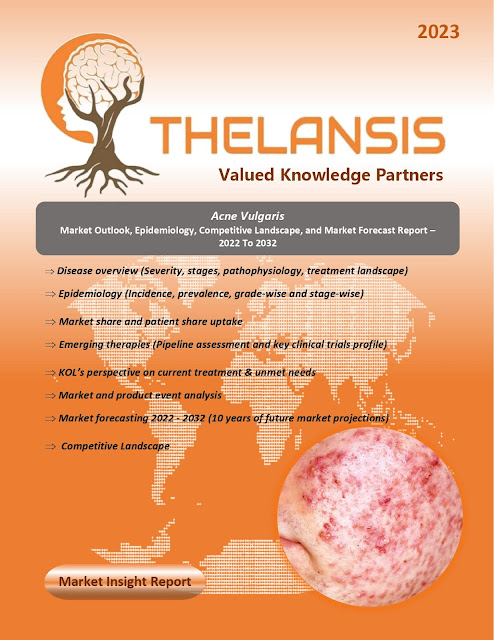SDH-Deficient Gastrointestinal Stromal Tumor (GIST) – Market Outlook, Epidemiology, Competitive Landscape, and Market Forecast Report – 2023 To 2033
Gastrointestinal stromal tumors (GISTs) are the predominant mesenchymal tumors in the gastrointestinal tract. They primarily occur in the stomach (50%-60%) and small intestine (30%-35%), while their occurrence in the colon and rectum is less common (5%), and in the esophagus, it is rare (<1%). Additionally, GISTs can develop within the abdominal cavity, specifically in the omentum, mesentery, or retroperitoneum (occurring in less than 5% of all GISTs). Specific mutations in the KIT gene drive the majority of GISTs (75%-80%) or PDGFRA gene (10%). However, around 10%-15% of GISTs do not exhibit detectable mutations in KIT or PDGFRA and are called KIT/PDGFRA wild-type GISTs. Succinate dehydrogenase comprises four subunit proteins (SDHA, SDHB, SDHC, and SDHD) and two assembly factors (SDHAF1 and SDHAF2). SDHA and SDHB form the catalytic component of succinate-coenzyme Q reductase, whereas SDHC and SDHD comprise the anchoring component that attaches the complex to the inner mitochondrial membrane. These tumors are more commonly observed in children and young adults. Most gastric GIST patients under 18 years old and a significant percentage of patients under 30 years old fall into this category. While the exact cause of SDH deficiency in these tumors remains unclear, the association between SDH deficiency and SDH gene mutations is well-established. The primary function of SDH is to participate in the interface between the tricarboxylic acid cycle and the electron transport chain. It catalyzes the oxidation of succinate to fumarate. This complex plays a crucial role in regulating hypoxia-inducible factor 1α (HIF1α), which is a subunit of HIF1. HIF1 is a transcriptional activator of IGF2 and VEGF. SDH-deficient GISTs present clinical manifestations similar to other gastric tumors, including gastrointestinal bleeding and epigastric discomfort. Some patients diagnosed with SDH-deficient GISTs may exhibit symptoms associated with metastatic tumors in the abdomen or liver. The differential diagnosis for SDH-deficient GISTs is comparable to that of other gastrointestinal stromal tumors, which include carcinoma, perivascular epithelioid cell tumor, melanoma, epithelioid leiomyosarcoma, epithelioid angiosarcoma, glomus tumor, and even neuroendocrine tumors, especially when the tumor demonstrates epithelioid morphology. Traditional chemotherapy has limited efficacy in treating GISTs; however, the tyrosine kinase inhibitor imatinib has shown promising results in inhibiting their growth.
- The overall incidence of GISTs was 0.70 per 100,000 people per year. Approximately 5% to 7.5% of all GISTs are SDH-deficient.
Thelansis’s “SDH-Deficient Gastrointestinal Stromal Tumor (GIST) Market Outlook, Epidemiology, Competitive Landscape, and Market Forecast Report – 2023 To 2033" covers disease overview, epidemiology, drug utilization, prescription share analysis, competitive landscape, clinical practice, regulatory landscape, patient share, market uptake, market forecast, and key market insights under the potential SDH-Deficient Gastrointestinal Stromal Tumor (GIST) treatment modalities options for eight major markets (USA, Germany, France, Italy, Spain, UK, Japan, and China).
KOLs insights of SDH-Deficient Gastrointestinal Stromal Tumor (GIST) across 8 MM market from the centre of Excellence/ Public/ Private hospitals participated in the study. Insights around current treatment landscape, epidemiology, clinical characteristics, future treatment paradigm, and Unmet needs.
SDH-Deficient Gastrointestinal Stromal Tumor (GIST) Market Forecast Patient Based Forecast Model (MS. Excel Based Automated Dashboard), which Data Inputs with sourcing, Market Event, and Product Event, Country specific Forecast Model, Market uptake and patient share uptake, Attribute Analysis, Analog Analysis, Disease burden, and pricing scenario, Summary, and Insights.
Thelansis Competitive Intelligence (CI) practice has been established based on a deep understanding of the pharma/biotech business environment to provide an optimized support system to all levels of the decision-making process. It enables business leaders in forward-thinking and proactive decision-making. Thelansis supports scientific and commercial teams in seamless CI support by creating an AI/ ML-based technology-driven platform that manages the data flow from primary and secondary sources.
_page-0001.jpg)



Comments
Post a Comment